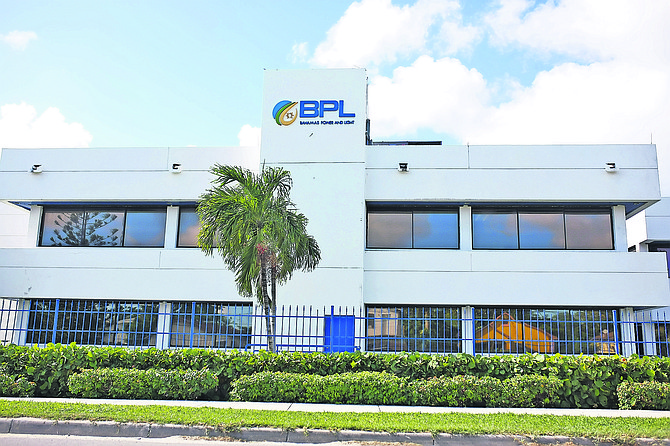By NEIL HARTNELL
Tribune Business Editor
nhartnell@tribunemedia.net
Bahamas Power & Light’s (BPL) chairman yesterday said the utility’s fuel hedging strategy will almost certainly be continued beyond end-June 2022 to protect customers from “wild price swings”.
Pedro Rolle told Tribune Business that while the details surrounding hedging’s continuation were still being worked out, with a final determination set to be made within the next two weeks, it was effectively a decision “already made”.
“We have as a Board taken a look at it, and it is currently being reviewed,” he said of the BPL fuel hedging strategy initiated under the Minnis administration-appointed Board. “There is an appetite for hedging. The Board is reviewing it, and where we are now, a final decision will be made in two weeks.
“We are still hedged at the moment. The way it works, the hedging is an ongoing thing. There is a hedging committee and each month they compute the hedge. We are going to have a hedging policy. There may be changes to it, but we are going to continue to be hedged. We can say that with some certainty.
“We will seek advice, and depending on where we think fuel prices are going or what might be happening, we will continue to ensure stability and not have wild fuel price swings that impact customers,” Mr Rolle continued.
“That’s a decision that has already been made fundamentally. We’re working out the details as to what extent we hedge and whether we change it. Those things are being looked at and we’ll make a final decision on it shortly.”
BPL’s fuel hedging strategy was billed as saving hard-pressed consumers and the wider economy some $150m over 18 months when it was introduced in July 2020 at the height of the COVID-19 pandemic, with the deal subsequently extended to end-June.
The move was seen as a triple win for BPL’s household and business customers; the Government and its fiscal position; and the overall economy and the foreign exchange reserves given that it eliminated volatility in the fuel price component - which makes up between 50-60 percent of customer bills - caused by fluctuations in global oil prices.
The hedge initially locked-in the fuel charge component of customer bills at 10.5 cents per kilowatt hour (KWh), providing businesses and households with electricity rate certainty at a time when their finances were under huge strain due to the economic crisis created by COVID-19.
BPL’s move, in theory, put control of the monthly electricity bill back in consumers’ hands. With rates fixed, and no longer vulnerable to global oil price fluctuations, Bahamian energy costs have since mid-2020 been determined by each business and households’ management of their consumption.
While consumers have been the direct beneficiaries, BPL’s reduced fuel costs have also helped ease the drain on the currently $2.4bn external reserves at a time when The Bahamas needs to preserve every cent of foreign currency it can get.
BPL’s annual fuel bill is one of the most significant drains on the foreign reserves, which are vital to maintaining the Bahamian dollar’s one:one parity with the US dollar. The hedge thus eased some of the anticipated pressure on the external reserves.
Mr Rolle, meanwhile, said BPL’s challenges “are well-known” and “there’s nothing here that’s shocking” to the new Board as it undertakes a rapid “learning process” to get to grips with the utility’s financial, operational and human resource challenges. “There is nothing what I consider to be out of the ordinary,” he added.
Examining the integration of renewables into BPL’s fuel mix, and reducing dependency on fossil fuels, is among the Board’s priority agenda items as it awaits the Deloitte & Touche accounting firm’s report that will assist the decision on whether to proceed with the utility’s mammoth $535m rate reduction bond (RRB) financing.
“I’m as anxious as you are,” Mr Rolle said of the wait for the report. “We are hopeful we can get some indication, certainly by the end of January. It may not be the final report; it may be an interim report.
“As soon as they are done we will take a look at it and make our decision. The information they provide will inform us in terms of where we go. It’s an important job, and the Board takes it seriously. It impacts our entire economy, which is why it is so important we make decisions based on the facts more than anything else.”





Comments
John 4 years, 1 month ago
Some are content with kicking the BPL ball further and further down the field. But unless and until BPL changes it’s fuel mix to include renewables and finds the funds to complete (or continue) upgrading its power plants and its distribution network, the dark cloud of uncertainty still looms. BPL must also get in to power management in addition to its power generation and distribution. Each building on Nee Providence shoul have solar panels that can provide basic energy needs and some that can sell power back to the grid. Economics has proven that a large number of small producers supplying energy over a network is more than one company trying to produce it all.
tribanon 4 years, 1 month ago
Even the best hedging strategy has to be rolled forward at price reset points based on current market prices and the price of a barrel of oil on the international markets is rapidly approaching US$100+. And that means much higher electricity bills for all of us are looming on the horizon like an ominously dark storm cloud.
Sign in to comment
OpenID